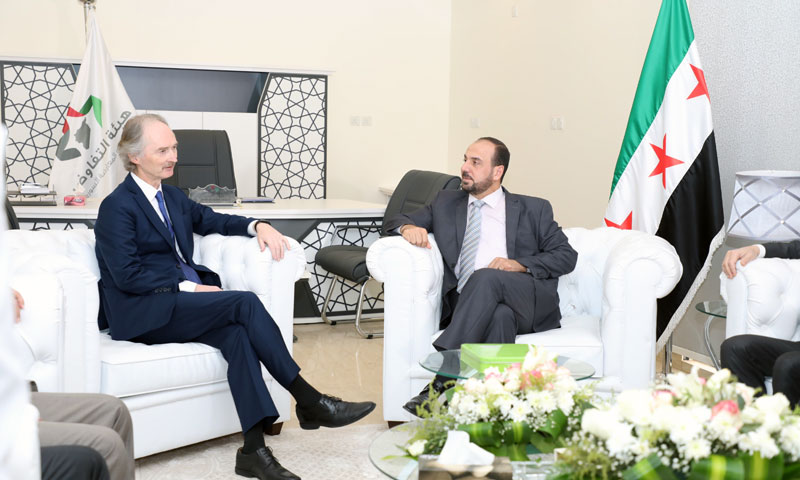



The first meeting of Syria’s constitutional committee, formed after two years of marathon negotiations, will be on 29-30 October in Geneva, Switzerland. Questions have been raised about what could be achieved with the committee. Some hope that the committee could contribute to an environment more amenable to a political solution where UN-supervised elections could happen. Others, however, fear that it might fall prey to regional political polarization between the interests of the regional players.
The first meeting will take place amidst the political division between the Syrian regime and the opposition despite the fact that both parties stress their work to ensure the constitutional committee’s success. U.N. Special Envoy for Syria Geir Pedersen has stressed in his meetings and announcements since the committee’s formation that it is the UN’s responsibility to build the trust between the warring parties (the Syrian regime and the opposition) and the supportive countries’ intention to put pressure on them for reaching an agreement.
High Negotiations Committee gearing up
Last week the Syrian opposition’s High Negotiations Committee (HNC) was on heightened alert as it began its work by holding several meetings in Riyadh, Saudi Arabia. The HNC aims at “discussing the constitutional options made by subcommittees and resolving these options to come up with a unified revolutionary vision of what to do during the meetings of the constitutional committee in Geneva,” as announced on 6 October by the HNC through its official Twitter channel. Moreover, the HNC organized several workshops to study the contents of the constitution in order to make the appropriate suggestions regarding them in accordance with United Nations Security Council resolution 2254. The HNC appointed Hadi al-Bahra as the co-chair for the opposition’s part of the constitutional committee (the other co-chair of the constitutional committee for the Syrian regime’s side has not been officially named yet). Furthermore, the HNC nominated the candidates for membership in the drafting committee (made up of 15 names) and distributed them on opposition platforms (Moscow Platform, Cairo Platform, the National Coordination Body for Democratic Change and independent figures ).
The Syrian regime, in the meanwhile, has kept silent. It made no announcements about its preparations for the meetings of the constitutional committee. There was no media coverage of any such preparations either. The Syrian state media focused on condemning Turkey’s military offensive against the People’s Protection Units (YPG) in the eastern Euphrates, the so-called “Operation Peace Spring”.
Additionally, the Syrian regime has made no declarations about the names of the select committee. Nevertheless, the Syrian al-Watan Newspaper, which is close to the Assad regime, quoted a source Thursday 17 October 17, that the People’s Assembly member, Ahmad al-Kuzbari, was chosen as the co-chair for the Syrian regime’s side of the constitutional committee. Moreover, Dr. Amal Yazji was selected to be the head of the regime delegation, as reported by al-Watan.
Political moves
The Turkish military operation in eastern Euphrates is taking up most of the political attention among the countries concerned with the Syrian file. Nevertheless, Russia’s keen interest in the constitutional committee was clear as the committee geared up to its first meeting. Russia dispatched President Vladimir Putin’s special envoy for Syrian affairs, Alexander Lavrentiev, and Russian Deputy Foreign Minister Sergey Vershinin to Iran and Turkey to meet officials of the two countries. Moreover, the high-level Russian delegation in Turkey also met the head of the HNC, Nasr al-Hariri and the co-chair of the joint committee, Hadi al-Bahra, according to an announcement by the Russian Foreign Ministry last Thursday.
The Russian delegation then headed to Damascus for meetings with the President of the Syrian regime, Bashar al-Assad, on Friday 18 October, according to the Facebook page of the Presidency of the Syrian Republic.
The majority needed to pass any article of the new constitution is proving to be problematic. According to the rules of voting procedures, in order to win the approval of the committee members articles require 75% of the votes, which is equivalent to 113 votes. Thus, the high threshold might obstruct the adoption of any article in the constitution, according to the head of the HNC, Nasr al-Hariri. In a discussion held in Istanbul with Syrian media, attended by Enab Baladi on October 16, the head of the HNC, Nasr al-Hariri affirmed that the HNC represents 75 votes out of 150 (the total number of the committee members). In other words, any party can thwart the adoption of any article that the other party tries to pass.
Al Hariri also talked about the difficulty in securing agreement among the committee members. He stressed that the success of the committee’s work and writing a newly agreed constitutional committee for Syria depended on the international will and the pressure exerted by the guarantor countries of the Syrian regime, particularly Russia.
if you think the article contain wrong information or you have additional details Send Correction